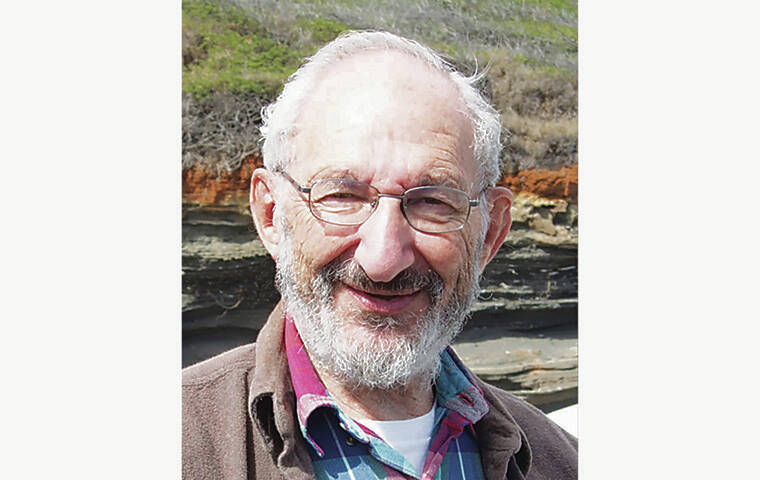Renowned gender identity researcher Milton ‘Mickey’ Diamond to be remembered

COURTESY PHOTO
Milton “Mickey” Diamond:
In 1967 he joined the John A. Burns School of Medicine as an associate professor of anatomy
The life and work of Milton “Mickey” Diamond, renowned for his work on gender identity and advocate for gender equality, will be celebrated Aug. 3.
Diamond, professor emeritus of anatomy and reproductive biology at the John A. Burns School of Medicine at the University of Hawaii at Manoa, died March 20 at his home in Honolulu. He was 90.
“I was so fortunate to have been with the most fabulous human being in the world for the last 42 years,” his widow, Constance “Connie” Brinton-Diamond told the Honolulu Star-Advertiser. “Not only did he have a giant mind that he used to benefit the world; he also had a giant heart. He did so much good for so many people around the world, particularly the people who are sexual minorities.”
Dr. Takashi Matsui, chair of the JABSOM Department of Anatomy, Biochemistry and Physiology, described Diamond as a passionate advocate of gender equality.
“Dr. Milton Diamond was well known for his advocacy and impact on gender studies,” Matsui said in a written statement. “His consistent and tremendous efforts in preserving equity and diversity around gender identity have empowered and saved lives on a global scale. Dr. Diamond will surely be missed as his legacy continues to live on.”
Diamond came to Hawaii in 1967 and joined the faculty of the John A. Burns School of Medicine as an associate professor of anatomy. He was appointed professor of anatomy and reproductive biology in 1971, and also served as director of the Pacific Center for Sex and Society within the school of medicine from 1985 until he retired from teaching in 2009.
Don't miss out on what's happening!
Stay in touch with breaking news, as it happens, conveniently in your email inbox. It's FREE!
Diamond’s contributions to Hawaii were not limited to the classroom. He was active in the successful campaign to legalize abortion; hosted an educational human sexuality television series on Hawaii Public Television in the early 1970s; formed a campus support group for gay, lesbian and trans students at UH Manoa later in the 1970s; and helped form the Hawaii AIDS Task Group in response to the AIDS epidemic in the early 1980s.
Diamond was known internationally for his thorough investigation of the case of David Reimer, a boy whose penis had been mutilated and then removed entirely after a botched circumcision. A consulting physician recommended to the boy’s parents that the infant’s remaining genitalia be removed, basic female genitalia be surgically created and the child be raised as a girl. The doctor then tracked the development of the child and his twin brother, and published several scholarly papers claiming that the child, then known as Brenda, was being successfully raised as a girl.
Diamond’s studies of clinical cases, of hormones and of the imprinting phenomenon and learning theory, led him to the conclusion that this was highly unlikely. He published several scholarly papers challenging the doctor’s claims and was eventually asked to be a consultant on a British Broadcasting Corp. documentary on the case that aired in 1980.
Diamond’s work on the issue resulted in responsible doctors around the world rethinking the practice of cosmetic surgical intervention on babies’ sexual organs.
When Diamond found Reimer, by then an adult, he was proved correct. Reimer had not been successfully raised as female, but reclaimed his birth gender identity as soon he learned what had been done to him. Reimer eventually received surgery to restore his original physical gender.
Reimer’s life experiences inspired playwright Anna Ziegler’s 2016 play, “Boy,” about a physician who decides to raise a mutilated male infant as a girl. The Actors’ Group staged “Boy” in Honolulu in 2017; Diamond was a guest of honor when he and his wife attended a performance during the run.
Throughout his career, Diamond wrote extensively about sex, sexual identity, family planning and pornography for professional journals and general interest publications alike. He was well known for his research into the development of sexual identity and was called on to serve as an expert witness in court cases and to comment on sex-related issues in mainstream media.
Diamond retired from teaching in 2009 but remained involved as a researcher and consultant on subjects including inter-sexuality, pornography and trans-sexuality until he retired fully in 2018.
Diamond was born and raised in New York. He graduated from City College of New York (now the City University of New York) with a degree in biophysics with additional studies in endocrinology and animal behavior, and then served three years in Japan as a commissioned officer in the Army.
After three years in Japan, Diamond continued his education at the University of Kansas studying anatomy, endocrinology and psychology. In 1962 he received his Ph.D. in anatomy and psychology for a thesis on “Differential Responsiveness of Pregnant and Non-pregnant Guinea Pigs to the Masculinizing Action of Testosterone Propionate.”
Diamond would continue studying the effects of in-utero hormones on the sex, gender and sexual behavior of animals and humans for much of his career.
It was only declining health that stopped Diamond’s research and his involvement in public health issues.
“What he wanted was to pass at home with my caring for him,” Connie Diamond said “He wanted it to be warm and with no pain, and he got that. “He just quietly went to sleep and didn’t wake up.”
In addition to his wife, Diamond is survived by daughters Hinda Diamond, Irene Diamond, Sara Diamond and Leah Diamond; stepson Andrew Brinton; stepdaughters Maia James Tidwell and Kristina Brinton; and 14 grandchildren.
A celebration of Diamond’s life will be held at 7 p.m. Aug. 3 at the William S. Richardson School of Law at the University of Hawaii at Manoa. Parking will be available at the UH Manoa Lower Campus parking structure.



